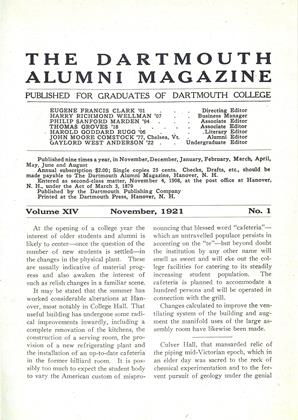C. F. Crathern, formerly of the class of 1920 and ex-captain of cross country, has resumed his studies at Dartmouth after spending 15 months with the Greek Army in Greece and with the Near East Relief behind the Turkish lines. He joined the Y. M. C. A. forces for work overseas in July, 1920, and was sent to Athens to assist in athletic and recreational work in the Greek Army. This kind of work was entirely new to the Greeks and Crathern and the other Y. M. C. A. men were commissioned in the Greek Army and the job of organizing an athletic program was put into their hands. They arranged games and other forms of recreation similar to the work done by the Y. M. C. A. in France. The work was so successful that a department was formed by the Greek Army officials to carry on the work and the Americans were no longer needed.
Crathern then started work with the Near East Relief and reached with great difficulty the portion of Asia Minor within the Turkish lines. It is interesting to note that while he was inside the Turkish lines he was still an officer in the Greek Army. On Thanksgiving Day he received word that his father was seriously sick at Eurfa in northern Mesopotamia. Crathern secured a leave of absence and spent the next three months getting to Eurfa, succeeding finally by going through Syria. The Turks took him prisoner at Eurfa, and as his father was too sick to be moved; he, with a few other Red Cross men, escaped by striking across the desert in .an ambulance. They crossed the Euphrates River at Birejik by putting a small round boat under each wheel of the automobile and poling it across, finally arriving at Beirut, Syria, where they learned that the Turks had released the other prisoners left at Eurfa.
Crathern worked last spring through Palestine, Arabia, and Egypt. He spent the past summer coming home byway of the Balkanis, ( Hungary, Austria, Germany, France and England, spending some time in each of these countries.
 View Full Issue
View Full Issue
More From This Issue
-
 Article
ArticleTHE UNDERGRADUATE'S RELATIONSHIP TO THE COLLEGE
November 1921 By ERNEST MARTIN HOPKINS -
 Article
ArticleAt the opening of a college year the
November 1921 -
 Sports
SportsFOOTBALL
November 1921 -
 Article
ArticleTWO DISTINGUISHED VERMONT ALUMNI
November 1921 By JAMES FAIRBANKS COLBY '72 -
 Article
ArticleMEMORIAL FIELD FAST BECOMING A REALITY
November 1921 -
 Class Notes
Class NotesCLASS OF 1905
November 1921 By Fletcher Hale
Article
-
 Article
ArticleLast month THE MAGAZINE had something to say concerning the advisability
January 1916 -
 Article
ArticleINDEX FOR THE MAGAZINE
April 1919 -
 Article
ArticleBUILDING OPERATIONS DURING THE SUMMER
July 1920 -
 Article
ArticleBOSTON UNIVERSITY CLUB PLANS LECTURE SERIES
FEBRUARY, 1927 -
 Article
ArticleCollege Sanctions Beer
June 1933 -
 Article
ArticleMILESTONES
October 1943

